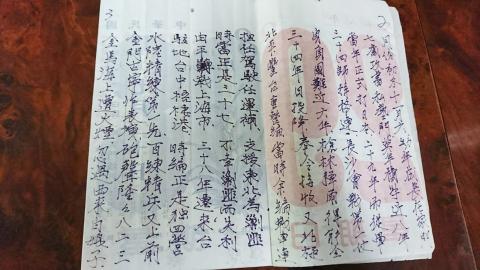The Hualien County Veterans Service Office said it plans to publish a collection of writings by 96-year-old Lee Chi-sen (李基森), who has been keeping a journal on the back of flimsy calendar sheets since his arrival in Taiwan from China 68 years ago.
Lee, born in China’s Sichuan Province, joined the Nationalist army at age 18. He was 28 when he arrived in Taiwan with the Chinese Nationalist Party (KMT) after its defeat in the Chinese Civil War in 1949.
He continued to serve in the military and was posted in Taichung and Kinmen before settling in Hualien’s Fengbin Township (豐濱) in 1994.

Photo: Courtesy of the Hualien County Veterans Service Office
“I have devoted my whole life to Taiwan, which is already my homeland,” said Lee, who considers himself “a true Taiwanese.”
Over the years, Lee cultivated a habit of collecting discarded calendar sheets and binding them with hemp string into small booklets, in which he has recorded by hand his recollections about war, travel and daily life.
During a regular visit last month, the center’s social workers found his work, the penmanship of which they described as “amazingly neat.”
Lee married a Chinese woman, but they filed for divorce years ago and their divorce lawsuit is still pending, social worker Kuo Hsu-fen (郭旭芬) said.
Lee practices calligraphy every day and has produced dozens of autobiographies, war memoirs and travel journals in the booklets made of calendar sheets, Kuo said.
“I am old and cannot remember things, so I have to write them down to avoid oblivion,” she quoted him as saying.
The office is to organize Lee’s writings and publish them soon, Kuo said.
There are about 8,000 registered veterans in Hualien, and the office’s social workers make regular visits to the homes of those in more remote townships such as Fengbin, Yuli (玉里), Fuli (富里) and Jhuosi (卓溪), Kuo said, adding that older veterans with special needs receive visits every three days.

US climber Alex Honnold is to attempt to scale Taipei 101 without a rope and harness in a live Netflix special on Jan. 24, the streaming platform announced on Wednesday. Accounting for the time difference, the two-hour broadcast of Honnold’s climb, called Skyscraper Live, is to air on Jan. 23 in the US, Netflix said in a statement. Honnold, 40, was the first person ever to free solo climb the 900m El Capitan rock formation in Yosemite National Park — a feat that was recorded and later made into the 2018 documentary film Free Solo. Netflix previewed Skyscraper Live in October, after videos

NUMBERS IMBALANCE: More than 4 million Taiwanese have visited China this year, while only about half a million Chinese have visited here Beijing has yet to respond to Taiwan’s requests for negotiation over matters related to the recovery of cross-strait tourism, the Tourism Administration said yesterday. Taiwan’s tourism authority issued the statement after Chinese-language daily the China Times reported yesterday that the government’s policy of banning group tours to China does not stop Taiwanese from visiting the country. As of October, more than 4.2 million had traveled to China this year, exceeding last year. Beijing estimated the number of Taiwanese tourists in China could reach 4.5 million this year. By contrast, only 500,000 Chinese tourists are expected in Taiwan, the report said. The report

Temperatures are forecast to drop steadily as a continental cold air mass moves across Taiwan, with some areas also likely to see heavy rainfall, the Central Weather Administration (CWA) said. From today through early tomorrow, a cold air mass would keep temperatures low across central and northern Taiwan, and the eastern half of Taiwan proper, with isolated brief showers forecast along Keelung’s north coast, Taipei and New Taipei City’s mountainous areas and eastern Taiwan, it said. Lows of 11°C to 15°C are forecast in central and northern Taiwan, Yilan County, and the outlying Kinmen and Lienchiang (Matsu) counties, and 14°C to 17°C

STEERING FAILURE: The first boat of its class is experiencing teething issues as it readies for acceptance by the navy, according to a recent story about rudder failure The Hai Kun (海鯤), the nation’s first locally built submarine, allegedly suffered a total failure of stern hydraulic systems during the second round of sea acceptance trials on June 26, and sailors were forced to manually operate the X-rudder to turn the submarine and return to port, news Web site Mirror Daily reported yesterday. The report said that tugboats following the Hai Kun assisted the submarine in avoiding collisions with other ships due to the X-rudder malfunctioning. At the time of the report, the submarine had completed its trials and was scheduled to begin diving and surfacing tests in shallow areas. The X-rudder,